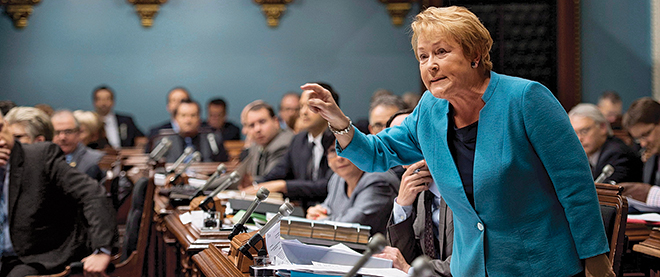Colby Cosh on the real reason to fear Quebec’s charter of values
Pauline Marois’s proposal is based on laïcité, for which there is no English translation
Jacques Boissinot / CP
Share

Is there anything to be said for the Quebec government’s idea for a “Charter of Quebec Values” that would forbid public employees from wearing religious symbols on the job? You would never know it from Canada’s English-language broadsheet newspapers: the Globe and Mail, for one, has completely abandoned its typical attention to artificial balance in public controversies and published at least five opinion pieces and several letters opposing the proposed charter, with nary a word in favour.
It may be that the Globe and other newspapers simply can’t find an anglophone opinionator to defend Premier Pauline Marois’s gesture in defence of laïcité. And it probably doesn’t help that the French term laïcité has no exact English equivalent, since it swims in an imprecise area between “church and state separation” (of the American type) and “anticlericalism” (of the European type). Quebecers are arguing over a concept we Anglo-Saxons don’t even have. And the polite, accepted English Canadian opinion is losing the argument inside Quebec, judging from the early polls and the attitude of the kingmaking Coalition Avenir Québec.
These are all pretty bad warning signs. The real purpose of trial ballooning a Charter of Values is certainly not to be gratuitously beastly to hijab-wearers: it is, rather, to invite the kind of outrage that English Canadian opinion leaders and federalist sages in Quebec have hastened to display. Marois is, for nationalist purposes, emphasizing the contradictions in the established system of religious accommodation. That system is predicated, awkwardly, on both the existence of a secular state and on the total freedom of expression of its individual servants.
It is just plain goofy to argue that a state cannot devise rules for the dress, the conduct, or the speech of its workers, and particularly of those workers who have responsibilities for education or advice, as teachers, daycare workers and nurses do. Yet that is the nature of the argument being advanced hastily against Marois and the hinterland Quebecers who support her. Asserting “freedom of religion” doesn’t settle the debate magically; as the Alberta Hutterites who were uncomfortable with driver’s licence photos found out when they went, in vain, to the Supreme Court in 2009, even sincere and long-established religious principles must sometimes bend to the aims of government.
The argument against Marois’s charter is not going to accomplish anything unless it becomes more sophisticated, and moves beyond mere imprecation. It will not help to shout, “Intolerant!”—or, as philosopher Charles Taylor cried, “Putinesque!” Health authorities are intolerant of dirty fingernails in the operating room, and I suppose Vladimir Putin probably is, too. Public schools are intolerant of peanut butter and wrong answers on math quizzes. The important question is whether purely personal, passive displays of religious faith by employees are inconsistent with the government of Quebec’s overall secular mission and nature.
To settle this question we would need to agree on what kind of secularity we are talking about, and this is how Marois has been able to whip up useful opposition so effectively. We Anglo liberals expect a passively secular government, one that merely prefers no religious sect over any other, and so we see a hijab in the daycare as a positive marker of success. It confirms that we are “secular” when a Muslim is allowed to express Muslim identity while working for the government. The French-style ideal of laïcité goes slightly further—toward expecting teachers and nurses to positively set aside their private religious identities while at work. This way of thinking sees the front-line government employee as being like a uniformed soldier, part of a great army of progressive nation builders. Some show of commitment is expected: while you are representing Quebec, you represent Quebec exclusively. And implied within laïcité is a subtle hope that religion will ultimately dwindle—that it will not so much be defeated, in the long run, as left behind.
That particular idea has a poor track record, and there is no harm in ridiculing laïcité on the sufficient grounds of mere hopelessness. But the commentators now attacking Quebec’s government as “subtly racist” (it was mighty big of the National Post’s John Ivison to include the “subtly”) imply that the legitimacy of that government depends on allowing its employees to wear a particular sort of hat while on duty. On a purely tactical level, that seems like a tough sell. Those who regard one function of the Quebec government as preserving a small, conquered nation are not very afraid of being “subtly racist,” and the more that government is barracked for racism over a law that has no racial content as such, the less afraid of the label its people are likely to be. Which, in turn, seems like something completely appropriate to fear.
On the web: For more Colby Cosh, visit his blog at macleans.ca/colbycosh